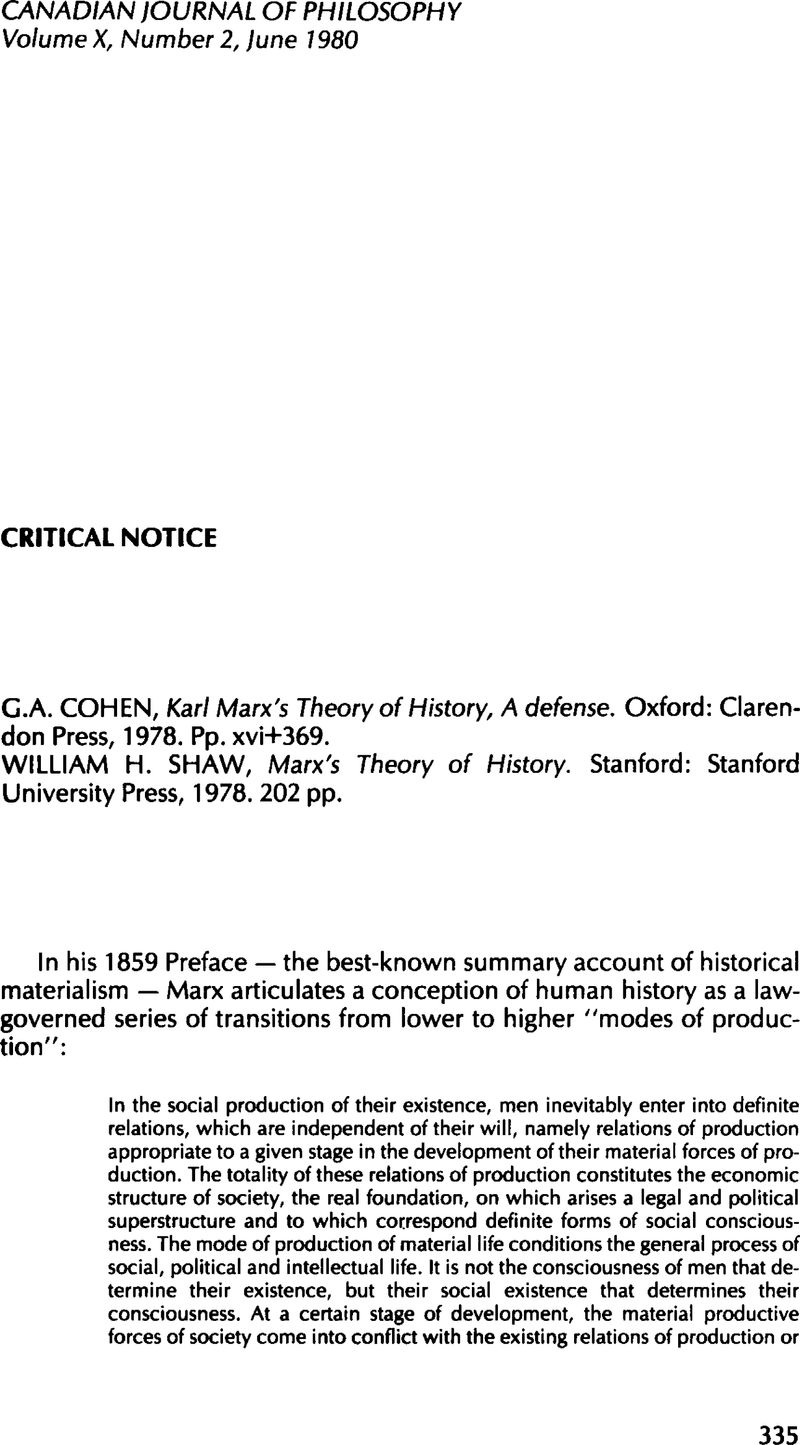Article contents
G.A. Cohen Karl Marx's Theory of History, A defense. Oxford: Clarendon Press, 1978. Pp. xvi+369. - William H. Shaw Marx's Theory of History. Stanford: Stanford University Press, 1978. 202 pp.
Review products
Published online by Cambridge University Press: 01 January 2020
Abstract

- Type
- Critical Notice
- Information
- Copyright
- Copyright © The Authors 1980
References
1 Marx, Karl Preface to A Contribution to the Critique of Political Economy (London: Lawrence and Wishart, 1971).Google Scholar To avoid continuous use of footnotes, I list below the editions of certain of Marx's works to be referred to in the text:
(a) Grunrisse, Martin Nicolaus translation (Harmondsworth: Penguin Books Ltd., 1973)
(b) Capital (Moxcow: Progress Publishers, 1972)
(c) The German Ideology, chapter one reprinted in Karl Marx and Frederick Engels, Selected Works in three volumes (Moscow: Progress Publishers, 1969), henceforth “S. W.”.
(d) Results of the Immediate Process of Production, appearing as Appendix in Marx, Karl Capital Volume 1 (Harmondsworth: Penguin Books Ltd., 1976)Google Scholar
2 This sentence combines, but with complete propriety, phrases on pages 285 and 134 of Cohen's book. It should also be pointed out that Cohen is curiously coy about attributing a technological “determinism” to Marx, apparently finding some distinction between this and a technological “explanation” of history; see in particular his note 1 on p. 147. I shall not be likewise coy in attributing a technological determinism to Cohen; I shall here ignore his apparent distinction between “explained by” and “determined by”.
3 See especially chapter IV of his book. Actually this sentence stands in need of qualification: Cohen says that there are in Marx relations of production that are not social relations at all, which he calls “work relations”. It is Just the social relations of producition, Cohen says, that Marx refers to in the Preface.
4 It is nonetheless somewhat misleading to characterise the relations of production in terms of “property” or “ownership”, as these are standardly con· ceived (and Marx himself would be the first to agree on this); since it is his view not so much that property is the property of persons, as that persons are the property of property. That is, even to characterise property or ownership relations as relations involving the power of certain individuals or groups over others is in Marx's view both superficial and misleading, since what is really at the heart of these relations is rather the power or domination or control of the products of labour, and especially of the means of produciton, over the producers. The nominal “owners” of these objects - those who appear on the economic stage as the wielders of power - are in reality the mere “personifications“ or human embodyments of the power exercised by these objects over their producers. Qua capitalist, a man is wholly an instrument of capital, “endowed with will and consciousness“; qua worker, on the other hand, a man is a resistant cog in the machine.
5 I shall not comment on this aspect of Cohen's book at any length, since Taylor makes it the focus of his own discussion; but I am bound to say that I find Cohen's functionalism no more plausible than Taylor's -a version of functionalism which as Cohen notes is an ancestor of his own. In fact I am not sure that Taylor's “teleological explanation” is not wholly incoherent. At any rate, we find in The Explanation of Behaviour (London, Routledge and Kegan Paul ltd., 1964), such conflicting statements as the following:
(1) ”… the fact that the state of a system and its environment is such as to require a given event if a certain result is to accrue can be perfectly observable … whether laws of this kind hold can be verified or falsified … To say that a system can only be explained in terms of purpose, then … does not involve making an unverifiable claim … “ (p. 10, italics mine).
(2) to the question of “whether animate beings must be given a different status from inanimate things in that their behaviour can only be explained in terms of purpose … no conclusive answer can be given, since the claim to special status involves a negative existential statement … “ (p. 272, italics mine).
- 1
- Cited by




